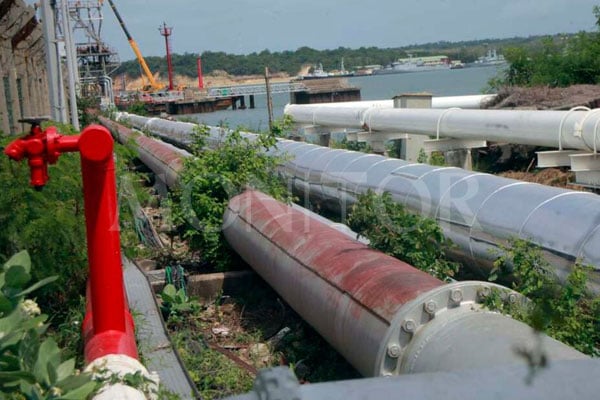Prime
Can local banks fund heavy oil projects?

It is increasingly becoming important that big ticket oil projects seek alternative sources of funding as the campaign against fossil fuels takes centre stage in the West. PHOTO | EDGAR R. BATTE
What you need to know:
- As the global campaign against fossil fuels sweeps in against Uganda’s oil projects, it is important to examine what is possible and which sources can oil companies tap in to raise capital for projects and investments.
Investments in oil and gas are facing financing challenges due to pressures from environmentalists pushing for renewable energies.
Uganda is caught between a rock and a hard place. More than 15 years after making its oil discovery public, the country is under pressure because its oil deposits are located in protected areas namely Murchison Falls Game Park, Budongo Forest, and the Albertine Graben to mention but a few, which host some of the endangered wildlife.
Added to that, the 1,443 kilometer East African Crude Oil Pipeline (EACOP) will pass through the Lake Victoria basin and in Tanzania’s game reserves - something that green activists are against.
Their campaign has seen them petition financial institutions including Citi Bank, JP Morgan and Societe Generale, among others to reverse their decision of pumping money in oil and gas projects.
As pessimists’ efforts are paying off, EACOP partners including Total Energies and CNOOC are scratching their heads to look for alternatives.
As the global finance market tightens the lid on oil and gas investments, can the local and regional finance markets step in?
How deep are the pockets of bankers?
Both local and regional finance markets have grown over the past years and some have been on the forefront of financing major infrastructure projects such as dams and roads, among others.
However, to the EACOP project partners, the idea of sourcing funding within the local market is something they had not considered.
“The EACOP is a $3.5b project and looking for such type of money on the local market is a tall order. So in our plans we had not considered that idea,” said Philippe Groueix the Total Energies managing director on the sidelines of the launch of the Tilenga Biodiversity Project recently.
As Uganda gears towards production of its first oil, the banking industry is anxiously waiting to make a killing.
One of the regional heavy weights is Equity Banks, which through Anthony Kituuka, the bank’s executive director, said they are setting up a war chest to harness the proceeds from oil.
“As a bank we have setup an oil and gas team composed of experts and some sizable capital which will be spread across various sectors including health, agriculture, logistics, hospitality among others,” he said, noting that the bank has a martial plan that cuts across the region and each country has a different arrangement because the needs are different.
The needs of Uganda a land locked country are different from the needs of Kenya a logistics hub or Tanzania, which will house the tail end of the pipeline. However, Mr Kituuka is quick to note that bankers have to seek partnerships or other sources of funding to reduce on their exposure while thinking of venturing into big money projects such as EACOP.
“The amounts required for this projects a huge and definitely we have to seek for collaborations and syndications or even get financing from outside. There is no single bank in Uganda, however, big that can lock away a billion dollar based on a single borrower’s limits,” he said.
As a bank, he said: “I can borrow but remember nobody can give a loan worth your value. And we are commercial banks at the end of the day we are answerable to our shareholders minus that we can’t put all our eggs in one basket.”
Away from sourcing funds and reducing exposure, bankers are faced with global inflation, which can change borrowing terms in a flash.
For big amounts of money, borrowers tend to look outside but any percentage in the interest rates has a significant effect on the long term borrower.
Capital markets and pension funds are also an option
Equity markets in Uganda have been growing steadily over the years. According the 2020 Capital Markets Authority report, it is estimated that domestic capitalisation of equity markets stands at Shs4.27 trillion.
In times of need, pension funds have been called upon to rescue both government and companies to finance large capital projects.
Dickson Ssembuya, the Capital Markets Authority director research and market development, said to finance projects such as EACOP, governments and partners can look at the $20b, which is held by pension funds across the region.”
Therefore, he said, pension savings can be tapped by issuing a capital markets instrument such as project infrastructure bonds to partly finance the pipeline.
Ssembuya, however, cautions that companies seeking to venture into oil and gas projects need to worry about the concerns of green campaigners, which have driven away investors as the world transitions from fossil fuels to zero emissions.
He also sights the low level of awareness among trustees of pension schemes on alternative investments.
Are fossils still around?
Although a date has been put as to how and when global economies should phase out fossil fuels, the same has not been done for developing economies such as Uganda.
According to Assad Lukwago, a senior partner at KPMG says the agenda in past was to phase out fossil completely but there was some lobbying by developing countries since they are at the bottom of the chain.
The plea from African economies was further boosted by a disruption in the oil supply due to recent events in Europe - the Russian War in Ukraine.
Therefore, the need to restore parity in the global supply chain will have countries such as Uganda breathe a sigh of relief.
Lukwago too points out the need for partnerships and notes: “The local finance market is yet to develop a muscle to raise such huge capital so if any of them is going to venture in they will have to look for partnerships.”




